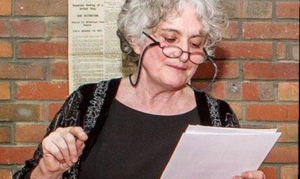Farewell to dear Comrade Deborah
 Many words come to mind when we think of our much-beloved Comrade Deborah Lavin: she was intelligent, charming and likeable; energetic, inspiring and self-reliant; warm and hospitable, witty, insightful and unswervingly devoted to the cause of the working class.
Many words come to mind when we think of our much-beloved Comrade Deborah Lavin: she was intelligent, charming and likeable; energetic, inspiring and self-reliant; warm and hospitable, witty, insightful and unswervingly devoted to the cause of the working class.
She was a woman of many talents, at one time running a school of English for foreign students in Islington, and raising three children alone in New Cross while working as an English tutor, an actress and stand-up poet, a playwright, a historian and a theatrical agent, Deborah demonstrated a remarkable flexibility and pragmatism in adapting to new careers and life situations.
Her political life was characterised by staunch support for all anti-imperialist struggles, for the socialist countries, and especially for the USSR; by unwavering opposition to Labour party social democracy and Trotskyism; and by a consistent championing of the needs and aspirations of the British working class.
Vehemently opposed to identity politics and to what she called the “green fascism” of Extinction Rebellion, she warmly welcomed the founding of the Workers Party of Britain, believing it to have the potential to become a mass organisation giving real voice to the demands of working people.
Equally passionate about history and social justice, an artist as well as a historian, Deborah wrote poems and plays, gave talks and lectures and researched endlessly. Outspoken and opinionated on almost every topic, from the correct way to make tea to the correct interpretation of world-shaking events, she nevertheless had the ability to deliver a ruthless put-down so charmingly that the sting was entirely removed, although the message lingered long.
Among the first to spot the insidious nature of the transgender movement and to recognise its pernicious ideology as a serious danger to the working class that would need to be addressed, she was also a fierce critic of euthanasia under capitalism, pointing out that the power of life and death simply couldn’t be trusted in the hands of a hostile state whose interest in workers ultimately comes down to their ability to work and make profits for capitalists, not their human needs.
She was involved in many historical societies and projects, curating five seasons of talks at Conway Hall and writing pamphlets and presentations for the Socialist History Society. Her magnum opus was her comprehensively researched biography of Edward Aveling, “toxic” partner of Eleanor Marx, whom Deborah convincingly presented as a traitor in the heart of the socialist camp.
Deborah was born Eileen Maurice Lavin in north Lambeth on 2 December 1951, the middle child of three to artist and dancer parents – Scottish father Michael and Mancunian mother Mary. Somewhere around the age of two, the young Eileen was rechristened ‘Deborah’ in the family, and Deborah she remained to everyone for the rest of her life.
Early in her twenties, Deborah developed a passion for Latin America. She became a, moved to Portsmouth and enrolled in the polytechnic to study Latin-American history. Along the way, she met and married her Argentinian second husband Gustavo Berns and in 1976 with whom she had three children. After the Berns’s marriage broke down Deborah remained in New Cross with the children, working as many jobs as necessary to keep her family together.
What hardships she had to deal with during this time, she never discussed, but she became a vocal advocate for the right of working-class families to decent homes with access to properly-maintained outside spaces as Britain’s social housing was slowly destroyed.
Sometime in the 1990s, Deborah began to publish poetry and plays. Both excoriating and witty, her plays tackled important but often-ignored social issues such as the black market trade in human organs. They were translated and put on in several countries, including Britain, Germany and Japan.
A born activist in all areas of life, Deborah’s introduction to Marxism came from her fondly-remembered Scottish grandfather, Patrick Michael Lavin, who was a member of Britain’s then-revolutionary communist party, the original CPGB. From Michael, she inherited her deep interest in all aspects of the revolutionary teachings and history of Marxism.
She eagerly jointed the Socialist Labour Party when it was formed on the initiative of miners’ leader Arthur Scargill in 1997. Working with comrades who would later go on to found the CPGB-ML, she threw herself into the task of building the SLP’s Camden branch, whose study classes she often hosted.
For the following 23 years, her commitment first to the SLP and then to the CPGB-ML, which she helped to found in 2004, was unwavering. She also gave sterling help with organising monthly meetings of the Stalin Society after its secretary Iris Cremer passed away in 2014.
She faced her final battle with lung cancer with characteristic cheerfulness while her younger daughter simultaneously battled with brain cancer. She travelled up and down to Edinburgh to see her most weekends until her daughter finally and tragically succumbed to the disease and she had to endure the ultimate heartbreak of losing a precious child before her time.
A staunch defender of the achievements of Soviet socialism and of Joseph Stalin’s leadership, Deborah had the true Marxist’s deep conviction of both the necessity and the possibility of building a revolutionary movement and achieving socialism in Britain.
Deborah died peacefully in her sleep on 23 March, surrounded by family. She leaves behind two brothers, Michael and David, her daughter Elizabeth, son Richard, and three grandchildren, Kit, Lottie and George. Her biography of Edward Aveling will be published posthumously.